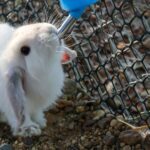Rabbits are known for their love of munching on grass, and it’s not just because it’s readily available. The grass is an essential part of a rabbit’s diet and provides them with various benefits.
As herbivores, rabbits have a unique digestive system that allows them to extract nutrition from the vegetation they consume, and the grass is a particularly important component of their diet since it is high in fiber.
It is time to change if your pet’s diet lacks greens and vegetation. You must gradually introduce this to your pet to help them get used to it. To help you better, we listed the nutritional benefits of feeding your pet with grass. But before that, let us first understand your rabbit’s digestive system.
Understanding Rabbit’s Digestive System
It is a common rabbit fact that rabbits are plant-based eaters. However, many people’s misconception is that it is easy to feed rabbits.
You need to understand that rabbits have different digestion work than other animals. A simple disruption can lead to gastrointestinal stasis, a common digestive problem.
Once you adopt a rabbit, you must know the basics of properly caring for them. One of them is how their digestive system works. This body function is the key to maintaining your rabbit healthy. They are also responsible for distributing the different nutrients to your pet’s body.
However, one disadvantage for rabbits is that their digestive system is a one-way trip. Your pet can only eat and release the food through its rectum as poop. That is why rabbits cannot also vomit.
But you can prevent them from feeling sick if you carefully plan their diet. Rabbits need to consume fiber-rich food because it is easier for them to metabolize this. Adding a limited amount of fruits and veggies as an additional nutrient source is also recommended.
Want to Know More About Rabbit Food: The Definitive Guide To What Foods Rabbits Can & Cannot Eat
Nutritional Benefits of Grass
The Grass is Rich in Fiber
According to the Rabbit Welfare Association and Fund, grass contains at least 20% fiber content. If your rabbit’s diet consists of this food daily, it will help them improve their digestive function. It’s also easier for your rabbit to produce a healthy-looking poop, indicating that their overall wellness is good.
The Grass Contain Different Vitamins and Minerals
Aside from fiber, the other vitamins and minerals of grass assist your rabbit’s body. It helps them have a strong immunity system to avoid common diseases. These nutrients include Vitamin K, protein, amino acids, and chlorophyll.
The Grass is Low in Fats and Sugar
Fats and sugar are one of the contents that you should avoid giving to rabbits. Your pet’s body cannot absorb these nutrients, especially in large amounts. The good news about grass is that it contains low fats and sugar, making it a perfect diet for them.
Other Possible Benefits of Grass on Rabbits
The grass is not only important for the digestive health of rabbits, but it also provides several other benefits to their overall well-being.
In addition to keeping their teeth healthy, grass can help prevent obesity and related health problems.
Furthermore, rabbits enjoy grazing on fresh grass, providing physical and mental stimulation. This can ease boredom and related behavior problems, such as destructive chewing and aggression.
Grass Feeding Guide
Feeding your pet rabbit with hay and grass is important, as it’s close to their natural diet. If your pet can’t stay outdoors, you can provide grass in their bowl daily.
If you’re introducing grass to your pet rabbit for the first time, do it gradually to avoid diarrhea. Note that sudden dietary changes may cause digestive problems. Once they become familiar with the nourishment, you can increase the grass or extend the feeding time.
Observing your pet’s poop droppings is also crucial when you feed them. If the poop droppings become too soft, limit the grass intake of your pet.
In addition to grass, rabbits also need a variety of vegetables and fruits to maintain a balanced diet. Research foods safe for your pet rabbit and avoid overfeeding them, as obesity can lead to health issues. Providing fresh water at all times is also essential for your rabbit’s health.
Read More:Rabbits Facts: The Common Question About Your Rabbits
Grass Vs. Hay
Hays
Hay is a dried grass cut and stored for later use. It contains a higher fiber content and is more convenient to feed your pet, as it doesn’t require daily harvesting. Hay is also beneficial for the rabbit’s dental health, as it helps wear down their continuously growing teeth.
Grass
While fresh grass is also a good addition to your pet’s diet, it should be offered in moderation and always be free from harmful chemicals. Grass treated with chemicals can be toxic to rabbits and cause serious health problems.
If you have a backyard, consider allowing your rabbit to graze on fresh grass under your supervision. This will provide them with a fun and enriching activity while giving them access to a natural source of nutrition. Alternatively, you can grow fresh grass in pots indoors to ensure a regular supply.
Types of Grass Available
Providing your rabbit with various kinds of grass can offer different nutrients and flavors for your pet. Any grass safe for goats, horses, or sheep to eat is also safe for rabbits. However, some grasses may be more beneficial or palatable for rabbits than others.
These are the best types of grass to grow for your bunny:
- Blackberry
- Brambles
- Flat grass
- Carpet grass
- Orchardgrass
- Clover
- Thistle
- Bermuda grass
- Dandelion grass
Things to Remember in Feeding a Rabbit with Grass
As a rabbit caretaker, you understand how delicate your pet’s stomach is. When nourishing a rabbit, you must exercise extreme caution with everything you offer. You must be very careful when feeding your pet. Know what they can and cannot consume.
Take note of these do’s and don’ts regarding vegetation to ensure your pet’s safety and well-being.
Do’s
- Provide fresh grass.
Ensure that the grass you provide your rabbit is fresh and free from any chemicals, such as pesticides or herbicides. Avoid feeding your rabbit grass that has been treated with chemicals or has been exposed to harmful toxins.
- Introduce grass gradually.
Just like with any new food, it is important to introduce grass gradually to your rabbit’s diet. This allows your rabbit’s digestive system to adjust to the new food and avoids digestive upsets.
- Monitor your rabbit’s behavior and health.
Pay attention to your rabbit’s behavior and overall health when introducing new foods to its diet. If you notice any signs of discomfort or changes in behavior, contact your rabbit’s veterinarian immediately.
- Provide hay daily.
Along with grass, hay should be a staple in your rabbit’s diet. Hay is a great source of fiber and is essential for your rabbit’s digestive health.
Don’ts
- Don’t overfeed
Overfeeding your rabbit can lead to obesity and other health issues. Ensure that your rabbit has a balanced diet and the right portion sizes.
- Don’t feed grass clippings.
Grass clippings can be contaminated with harmful chemicals or contain mold that can make your rabbit sick.
- Refrain from feeding dried grass.
Dried grass can be tough on your rabbit’s digestive system, leading to digestive upsets or blockages. Stick to fresh grass to keep your rabbit healthy.
- Refrain from feeding grass from unknown sources.
Only feed grass from sources you know and trust. Grass from unknown sources may contain harmful chemicals or toxins that can harm your rabbit.
- Refrain from replacing hays with grass.
While grass can be a healthy addition to your rabbit’s diet, it should not replace hay. Hay is essential for your rabbit’s digestive health and helps keep their teeth healthy and strong.
By following these tips, you can ensure that your rabbit gets a healthy and balanced diet of grass and hay. Always monitor your rabbit’s behavior and health if you notice any changes or signs of illness.
Conclusion
- The grass is essential to a rabbit’s diet, providing nutrients and fiber while helping move food along the digestive tract. It is also low in calories, high in fiber, and can prevent obesity and related health problems.
- Fresh grass can also provide physical and mental stimulation to prevent boredom and related behavior problems. Different types of grasses can offer different nutritional benefits.
- Hay, a dried form of grass, is also essential for a rabbit’s diet as it is a good source of fiber and beneficial for dental health. However, grass should be offered in moderation and always be free of fertilizers, pesticides, and other harmful chemicals.
- It is important to note that while the grass is important, it should not be the only thing a rabbit eats, and a balanced diet should also include hay, fresh vegetables, and a limited amount of commercial pellets.


